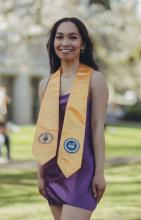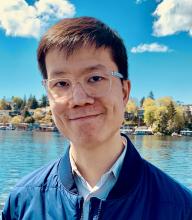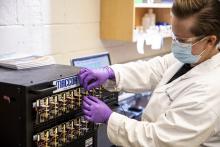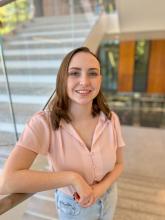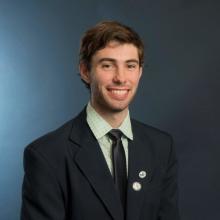In the Department of Chemistry, we believe that diversity and inclusivity are integral to excellence and acknowledge that important work is being done by our students and postdoctoral researchers in this space. It is a pleasure to announce the 2023 recipients of the Diversity, Equity, and Inclusion Leadership Awards, selected by the Chemistry Diversity and Equity Steering Committee. These awards of $500 were supported by the Martin P. Gouterman Endowed Fund in honor of Professor Gouterman’s activism for the LGBTQ+ community and his legacy to create “a more humane and inclusive scientific enterprise” (Angew. Chem. Int. Ed. 2021, 60, 9760–9770).
Diversity, Equity, and Inclusion Leadership Awards
Elouisa Flores is a biochemistry major who works every day to make the STEM field as inclusive as she can by being welcoming and encouraging to those around her. Five students nominated Elouisa for this award with testimonies on how Elouisa promotes inclusivity and cultivates a welcoming environment wherever she is—in the lab, studying with others, or at work. Elouisa is empathetic to all, goes above and beyond to help others be successful, and deftly accommodates and uplifts others. She mentors other students with patience and understanding. One nominator wrote, “I believe this exemplifies inclusive excellence because she made me feel comfortable and not scared to ask her questions when I had any.” Another wrote, “Elouisa is always willing to provide materials, safety, knowledge, and other resources to help her peers.” She welcomes new co-workers, not only helping them to learn the job, but also helping them to meet other people and make friends. Upon completing her own work in the lab, Elouisa stays late to help staff and other students clean up. She has washed other students’ glassware to help them finish an experiment on time. As an LSAMP ambassador, Elouisa worked to bring resources to fellow minority students. She grew as a leader through LSAMP events and helped her fellow ambassadors grow by sharing her perspective on what a leader was to her. Elouisa plans to become a woman's health doctor whose presence will diversify the field and give patients who look like her a chance to have a doctor who can empathize with their life experiences. She wants her achievements in the medical field to inspire her peers to join or continue in the field and have their own unique identities to diversify STEM.
Daniel Ong is an undergraduate student double majoring in chemistry and biochemistry, and he conducts undergraduate research in the lab of Associate Professor Jesse Zalatan. Daniel is involved in the Promoting Chemistry Undergraduate Research Equity (ProCURE) working group, where he helped to organize and participate in a Chemistry Undergraduate Research panel discussion about undergraduate research experiences within the department. To promote research beyond the field of chemistry, Daniel works as an Undergraduate Research Leader (URL). In this role, he collaborates with Undergraduate Research Program Staff and other URLs to inform first-year students on undergraduate research. As a First-Year Interest Group Leader, Daniel designed a 10-week course that guides first year students, many of which are from historically underrepresented backgrounds in STEM, in their academic transition into UW. Daniel uses his own academic and research experiences to help other students not only succeed in their STEM courses but begin their own research journeys at UW as well.
Emma Cave is a doctoral candidate in the research group of Associate Professor Cody Schlenker. During her time in the program, Emma has held various leadership positions in several clubs, including Outreach Coordinator and Vice President for Inclusion in Chemical Sciences, and Graduate Outreach Coordinator and President for oSTEM (Out in Science Technology Engineering and Mathematics). Additionally, Emma has assisted in a course centered around culturally responsive teaching practices (CHEM 590B). In 2020, she (along with several members of her cohort) shifted her focus to reducing barriers for undergraduate research in the department which lead to the foundation of the group called ProCURE (Promoting Chemistry Undergraduate Research Equity). In this group, she has focused on one of their initiatives: to improve information accessibility for undergraduate students interested in research. Her efforts include planning two separate undergraduate panels for prospective researchers to hear about the experiences of fellow undergraduates who participate in research within the department. Additionally, Emma established contact with the undergraduate advisers to partner in improving the information accessibility on the chemistry department’s website. As Emma’s time at UW comes to an end, she hopes to leave behind a foundation of work for the next generation of graduate students to continue to build upon.
Emily Cliff is a doctoral candidate in the research group of Associate Professor Jesse Zalatan. She desired to tackle the issue of STEM’s leaky pipeline and address it at the undergraduate level. Emily has served as a leader within ProCURE (Promoting Chemistry Undergraduate Research Equity), where she has collaborated with various faculty and staff across the department to discuss the development and implementation of a system to fund underrepresented minorities (URMs) and socioeconomically disadvantaged undergraduate students participating in research. Emily developed a survey to hear from students in 100- and 200-level courses about the barriers and accessibility of undergraduate research. The work of Emily and others was a catalyst for the department to pilot a program for funding undergraduate research last summer, which is expected to take place again this coming summer. Emily strives to improve the inclusivity and accessibility of scientific research within the department.
Garrett Santis is a third-year graduate student working with Affiliate Professor Sotiris Xantheas. During his first three years, Garrett has become a strong leader of the UW community and has used that position to promote diversity and inclusion across the department. Garrett serves actively as the Graduate Club president, with the mission of fostering a strong community in the UW Chemistry graduate student body. As president, Garrett has actively increased inclusion by formally co-hosting events with oSTEM (Out in Science Technology Engineering and Mathematics), accommodating dietary restrictions at social events, and securing funding for outings to overcome financial barriers to participation. Outside of formal commitments to the department, Garrett has led numerous seminar series including the spectroscopy seminar and the Computational Research Leadership Council (CRLC) seminar series. The latter was organized in conjunction with Inclusion in Chemical Sciences (InCS) to connect the diverse group of scientists at the Department of Energy to underrepresented students in computational sciences. The seminars demonstrated the opportunities at national labs and non-traditional pathways to high-impact research careers. These seminars have facilitated connections between students and potential careers; those who have worried about barriers such as their identity or background now see a pathway to the careers they want.
Honorable Mentions
Aja Lujan, biochemistry major
Alexander Dohoda, PhC
Editor’s note: Thanks to graduate student Adelaide Levenson for her contribution in creating this news post.

